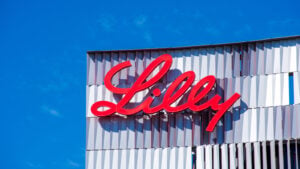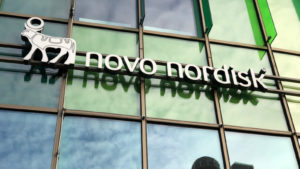Now, some concerns around potential side effects and the ability to wean off of these drugs once a target weight has been hit are starting to ruminate in the market. However, given the massive potential size of the overall addressable market globally, there is growth ahead for these three names.
Here are three weight-loss stocks worth considering as a multi-year bet in this macro backdrop.
Eli Lilly (LLY)

Eli Lilly (NYSE:LLY) remains a top beneficiary of the move toward GLP-1 drugs. The company’s Mounjaro drug is approved for diabetic patients, while Zepbound targets the much larger obesity and chronic weight management market. Both drugs have seen strong uptake since their approvals, leading to massive growth for the pharma giant, which has been baked into Lilly’s stock price (and then some).
Now, the question is whether Eli Lilly is worth investing in at 130 times earnings. Of course, that depends on where investors see the company’s growth rate, which is one, five, or 10 years out. In my view, Lilly’s mission to promote essential health and survival is key to investing in this stock over the long term. The company prioritizes inclusivity in its clinical trials and access to medicines and could be doing more for the unhealthy population among us than any other company in the market.
Recently, Eli Lilly commenced construction on a $2.5 billion manufacturing facility in Germany to boost production of tirzepatide, the scientific name of its Mounjaro and Zepbound drugs. This will certainly be a pivotal investment, employing up to 1,000 people in production and R&D. Scheduled operations begin in 2027. Investors will want to closely watch how this rollout impacts earnings and profitability growth in 2027 and beyond.
Novo Nordisk (NVO)

Novo Nordisk (NYSE:NVO) is another top weight-loss stock generating outsized attention for its Wegovy GLP-1 injection, similar to Eli Lilly’s offerings. However, the company has also announced the development of a weight loss pill, which has accelerated interest in this company relative to its peers. Who knew so many of us hated needles?
Recently, Novo Nordisk Foundation resubmitted a $16.5 billion application to acquire Catalent to U.S. regulators after withdrawing an initial submission in response to informal discussions. The acquisition aims to bolster production capacity for the weight-loss drug Wegovy. Completion details and the approval timeline remain undisclosed, but this is a key factor for long-term investors banking on capacity expansion in this space.
George Soros of the Soros Fund appears to be among the investors who believe in Novo Nordisks’ long-term plans. His fund acquired 1.5 million shares of NVO stock worth nearly $140 million. This move further embeds Novo Nordisk in the portfolios of many high-profile hedge funds as investors look to benefit from sky-high future demand and profitability from these injections (and prospective pills).
Novo Nordisk’s Wegovy demonstrated benefits for patients with obesity, diabetes and heart failure. The study, presented at a conference and published in a medical journal, supports this drug’s potential expanded usage. And if regulators agree to a pill, Novo Nordisk could separate from the group and charge ahead as the leader in this sector.
Viking Therapeutics (VKTX)

Viking Therapeutics (NASDAQ:VKTX) stock has been on quite the tear this year, surging more than 250% on a year-to-date basis alone. Another contender in the potential weight-loss pill market, the company’s recently-announced pill option has garnered plenty of interest from investors big and small.
Positioned as a critical player in a growing market, Viking Therapeutics plans further clinical trials for this pill. The company’s Phase 1 trial saw very strong results, with patients who took the pill daily losing more than 5% of their body weight on average. Now, Viking’s CEO Brian Lien expressed some uncertainty about the durability of this weight loss over time. More studies will need to be conducted to confirm these data. But for now, encouraging sustained results position the company well for a potential approval of its pill.
Clinical trial results are always hard to invest in and trade on. But in this case, Viking’s core drug appears to be a solid front-runner for this high-growth market. Safety concerns were mild, and the noted side effects aligned with other patients’ observations with injectables. On that note, Viking’s VK2735 injection, an obesity treatment in phase 2 trials, has shown promising results, boasting 14.7% weight loss over 13 weeks. With favorable trial outcomes, this company could be one of the best ways to play the weight-loss drugs space.
On the date of publication, Chris MacDonald did not have (either directly or indirectly) any positions in the securities mentioned in this article. The opinions expressed in this article are those of the writer, subject to the InvestorPlace.com Publishing Guidelines.
Chris MacDonald’s love for investing led him to pursue an MBA in Finance and take on a number of management roles in corporate finance and venture capital over the past 15 years. His experience as a financial analyst in the past, coupled with his fervor for finding undervalued growth opportunities, contribute to his conservative, long-term investing perspective.
